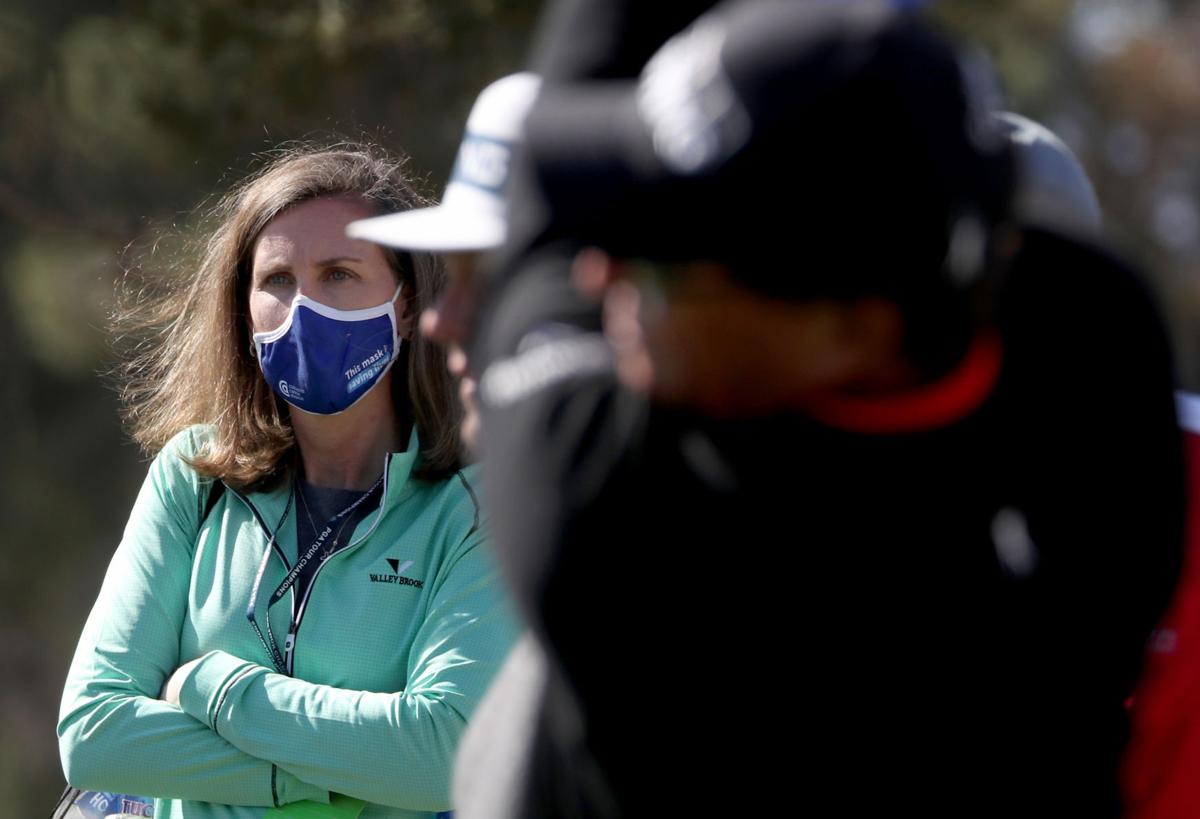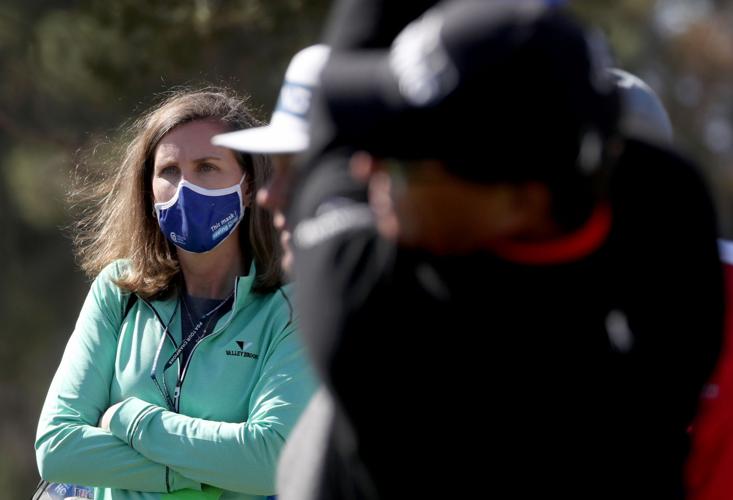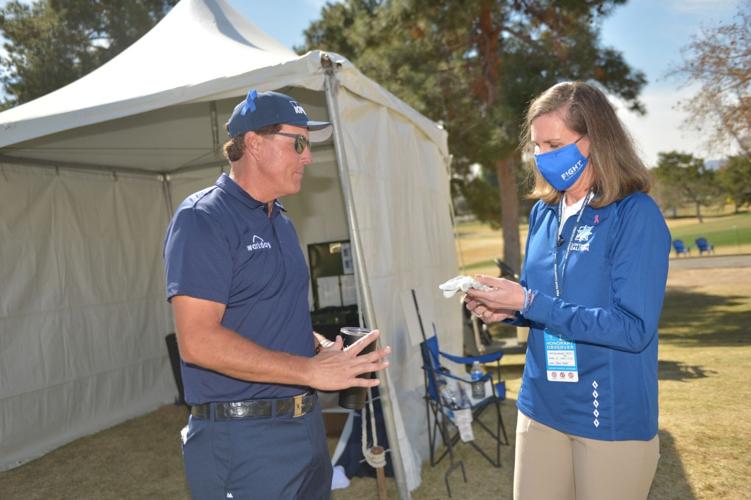Stacy Hurt had an 8% chance of survival in 2014.
Eight.
The Pittsburgh native — born and raised — was a 44-year-old mother of two boys, Emmit and Griffin, and wife to her husband, Drew. She was a basketball player and competed with Penn State’s club volleyball team during her college days, and even when Hurt maintained a healthy diet and exercise regimen, she developed signs of cancer.
Hurt experienced abdominal pain, blood in stool, inconsistent bowel movements, and was always fatigued.
“I ignored them early on,” Hurt said.
But the signs didn’t taper off, they got worse.
Experiencing relentless discomfort, Hurt went to an oncologist in Pittsburgh for a screening, and a colonoscopy revealed an 11-centimeter tumor in her rectum that had metastasized to 27 different places in her body including her liver, lungs and lymph nodes.
People are also reading…
Hurt’s diagnosis was stage four colorectal cancer, the disease highlighted for spreading awareness at the Cologuard Classic, a PGA Champions Tour tournament at Omni Tucson National, on her 44th birthday in September.
When she asked the oncologist about the chances of her recovery, he became unforthcoming.
“I just wanted him to say, ‘You can beat this, and he didn’t say that,’” Hurt said. “He said: ‘A lot of this depends on you and how you respond.’
“I said to him: ‘If it depends on me, I’m going to kick its ass.’ He responded with, ‘That’s what I wanted to hear.’ And that’s how I went into it.”
Hurt didn’t have 8% ingrained in her head thanks to her tight-lipped oncologist, but her athletic background allowed her to have a competitive spirit in the fight for her life.
“I’ve always been super competitive and I commit to anything I do,” she said. “I turned myself into a lean, mean, cancer-fighting machine. I told myself, ‘If I’m not going to survive this, I’m going down knowing I did everything to survive and beat it,’ and it worked out for me. I’m very blessed and very lucky.”
Her mental fortitude never wavered even when the chemotherapy period and radiation treatment was taxing. Hurt nearly lost her life during surgery, when a blood vessel was knicked causing her to internally bleed and lose half of her blood.
On top of Hurt’s battle, she was raising two boys, who weren’t even teenagers during her treatment. Hurt’s youngest son, Emmit, is severely intellectually and developmentally disabled, and can’t walk, talk or care for himself.
“So we had the double-challenge of fighting stage four cancer and caring for our disabled son. How we got through those days, I have no idea,” she said. “A lot of it goes to my husband, my parents basically moved in with us, because those were tough times. But again, great support system and wonderful friends.”

Stacy Hurt chats with Phil Mickelson.
So how did Hurt overcome great odds?
“It begins with attitude and it begins with that mindset of having a positive attitude and really going into it fighting hard and not giving up,” said Hurt. “Mental toughness really had a lot to do with it. I had to say, ‘I’m tougher than this cancer, I’m tougher than this chemo, this is not going to get me down and I’m going to keep going.’”
The first item on her get-right checklist was to change her personal lifestyle completely to enhance . Hurt converted to a plant-based diet, increased physical activity and eliminated alcohol, dairy and unhealthy sugars. No wine. No beer. No cake. No cookies.
The Hurt family also prioritized sanitation and maintained a clean environment at their home. Visitors were forced to take off their shoes upon entry, washing hands became second nature and disinfecting areas around the home was an everyday task.
Reminder: This was well before COVID-19.
“When Covid happened, I was like, ‘I’m a pro at this! Welcome to my world,” Hurt said. “I think Covid taught a lot of people to have empathy to those points of what survivor patients go through on a daily basis. It was a real eye-opener.”
Every precautionary step Hurt took, it improved her chances of beating a disease that takes the lives of over 53,000 people annually, the second leading cause of cancer death for men and women in the U.S., according to cancer.net.
In 2015, Hurt was cancer-free but stayed vigilant to avoid remission, so she’s still committed to her strict diet and exercise routine. Hurt turned 50 this past September, and has done advocacy work for colorectal cancer.
Hurt’s journey regarding her fight with cancer didn’t end in Pittsburgh.
Two Fridays ago, she received an email from the Colon Cancer Coalition that she was virtually paired with Hall of Fame golfer and PGA Champions Tour newbie Phil Mickelson, her all-time favorite player, at the Cologuard Classic. Each golfer in the 81-player field wore a blue ribbon with the name of a survivor etched on it.
Uncertain if she should attend the event due to the pandemic restricting the event to 200 spectators, Hurt’s husband nudged her to go see the golfer who was representing her fight and experiences with cancer. She didn’t second-guess Drew’s suggestion.
“I’m getting out of Pittsburgh, I’m getting some sunshine, I’m getting a massage and I’m just showing up,” she said.
Determined to meet Mickelson at a distance, Hurt flew out to Tucson from Pennsylvania, and with a helping hand from the PGA, she met the golf legend on the first tee box as an honorary observer before the second round of play at the Cologuard Classic.
“Just wanted to let you know we’re always pulling for you,” Mickelson said while handing her an autographed glove, “so I’m happy that you’re doing so well in your struggle. I’m sorry you had to go through that, it’s awful.”
A 30-second exchange she’ll cherish forever.
“Just incredible. I can’t put it into words,” said Hurt. “I had fought so hard to be alive, and to meet someone you always followed and looked up to and admired, who epitomizes what you fought for, it was unbelievable. … He’s so warm and so gracious and just everything you see on TV.”
More importantly, her time in Tucson was spent using her first-hand experience with colon cancer as a way to spread awareness of the disease, which is what the tournament is dedicated to. It’s more than just a golf event for seasoned veterans, it’s a platform.
“One message I want people to know is that this golf tournament is not just about golf. We are here to raise awareness for colorectal cancer. That is very important to me. … It is on the rise in young people,” said Hurt. “Look at me, I was 44, totally healthy, athlete — and if it happened to me, it could happen to anybody. What I want people to know is that I want them to get screened.
Added Hurt: “As a survivor and overcoming those odds and someone meeting their golf hero … that’s just everything to me. That’s everything I fought for and everything I’m here for. My life was spared when we lost so many people to this disease. If I’m here and showing up, I’m getting the message out. We have to pay attention and you have to get screened.
“I wake up everyday and thank God that I’m still here.”
Photos: Kevin Sutherland wins 2021 Cologuard Classic golf tournament in Tucson
2021 Cologuard Classic

Kevin Sutherland hits out of a trap on the night hole of the final round of the Cologuard Classic at the Omni Tucson National Resort, Tucson, Ariz., February 28, 2021.
2021 Cologuard Classic

Kevin Sutherland gets a fist bump from his caddy after draining a long chip from the fringe on the 16th hole during the final round of the Cologuard Classic at the Omni Tucson National Resort, Tucson, Ariz., February 28, 2021. The chip got him into a tie with Mike Weir.
2021 Cologuard Classic

Mike Weir hits out of the bunker on the 16th hole of the final round of the Cologuard Classic at the Omni Tucson National Resort, Tucson, Ariz., February 28, 2021. Weir dropped out of the lead on the hole into a tie with Kevin Sutherland.
2021 Cologuard Classic

Mike Weir has to hit from the bunker for the second straight hole on 17 during the final round of the Cologuard Classic at the Omni Tucson National Resort, Tucson, Ariz., February 28, 2021.
2021 Cologuard Classic

Kevin Sutherland gets help donning his trophy after coming from behind in the final round of the Cologuard Classic at the Omni Tucson National Resort, Tucson, Ariz., February 28, 2021.
2021 Cologuard Classic

Kevin Sutherland waits on 18 take his putt, holding one stroke lead over Mike Weir on the final day of the Cologuard Classic at the Omni Tucson National Resort, Tucson, Ariz., February 28, 2021.
2021 Cologuard Classic

Kevin Sutherland drives from the tee box on the 16th hole during the Cologuard Classic at the Omni Tucson National Resort, Tucson, Ariz., February 28, 2021.
2021 Cologuard Classic

Phil Mickelson stands on the second green after leaving a putt short of the hole during the final round of the Cologuard Classic at the Omni Tucson National Resort, Tucson, Ariz., February 28, 2021.
2021 Cologuard Classic

Mike Weir drops in a putt on the fifth hold during the final round of the Cologuard Classic at the Omni Tucson National Resort, Tucson, Ariz., February 28, 2021.









